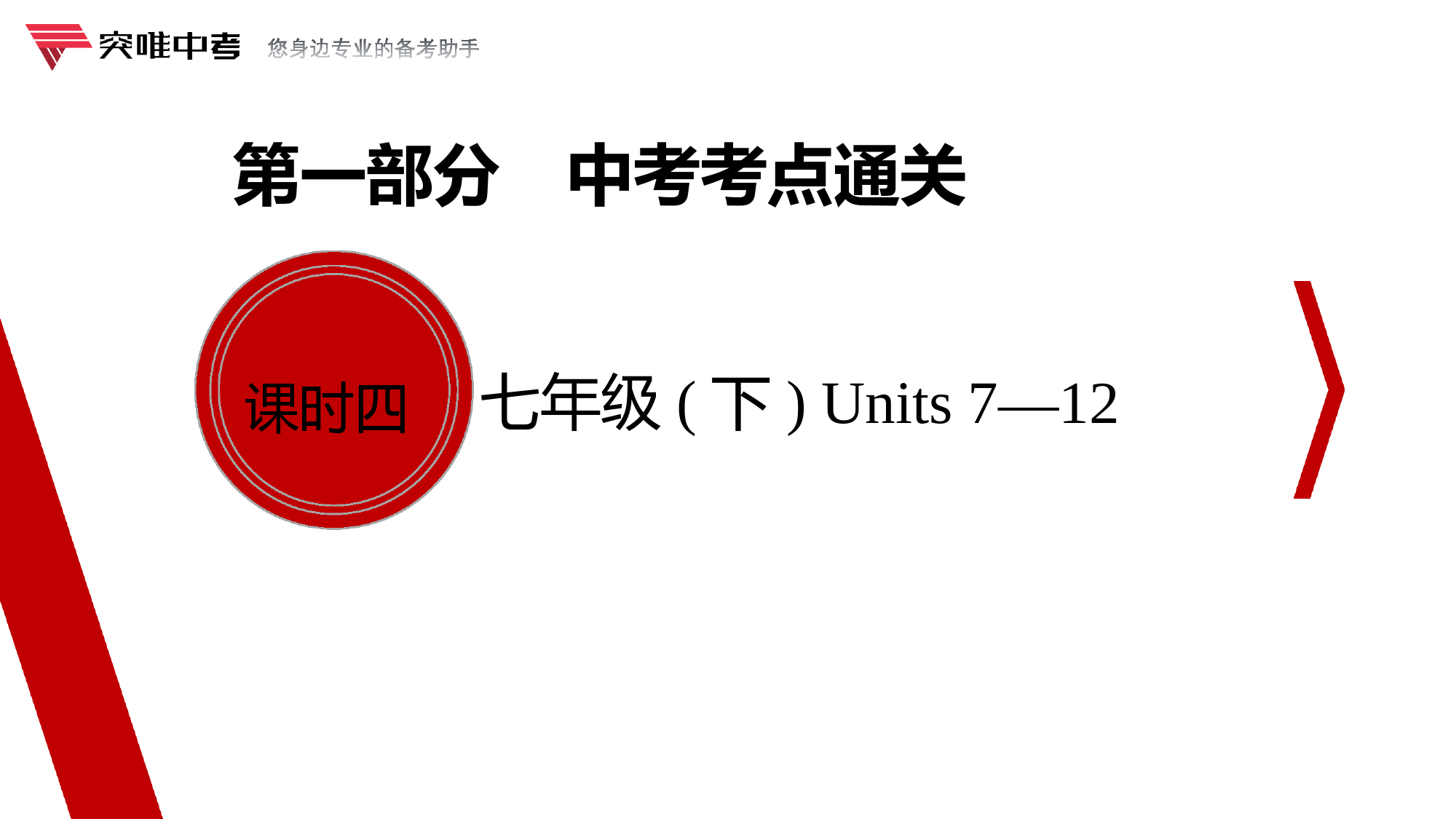


2024版《突唯》河南中考总复习2024英语第一部分中考考点通关七年级(下)Units7—12课时四补全对话通关练教材考点梳理考点1询问天气的句型How’stheweatherinBeijing?北京的天气怎么样?(Unit7P37)“How’stheweather(+介词+地点、时间)?”=“What’stheweatherlike(+介词+地点、时间)?”,意为“(某地、某时)天气怎么样?”,回答时用“(It’s+)表示天气状况的形容词”。常见的表示天气状况的形容词有sunny、rainy、windy、cloudy、snowy、foggy等。如:—HowwilltheweatherbeinZhengzhoutomorrow?=WhatwilltheweatherbelikeinZhengzhoutomorrow?郑州明天的天气怎么样?—Itwillberainy.将会下雨。注意:(1)weather是不可数名词,意为“天气”,前面不可用不定冠词a或an修饰。(2)询问未来的天气,其句型为“Howwilltheweatherbe+其他?/Whatwilltheweatherbelike+其他?”答语通常为“Itwillbe+表示天气状况的形容词.”。盲填。1.—theweatherlastSunday?—Itwassunnyandtheskywasblue.2.—theweatheroutside?—Itcan’tbehotter.Youcanevenfryaneggonthestreet!HowwasWhatislike考点2Howisitgoing?句型Howisitgoing?近来怎么样?(Unit7P39)“Howisitgoing?”=“Howarethingsgoing?”“Howiseverythinggoing?”意为“一切都好吗?”,用来询问事情的进展情况或近况。“How+be+名词+going?”意为“……怎么样?”。肯定回答常用“Prettygood!/Great!/Notbad.”等;否定回答常用“Notsowell./Terrible.”等。如:—Tom,how’sitgoing?汤姆,最近怎么样?—Prettygood.非常好。盲填。3.—Longtimenosee!isitgoing?—Great!IjusthadagoodsummervacationinBeijing.4.—HowisyourChinesegoing?—.Icanreadprettywellandmywritinghasimproved.HowNotbad考点3辨析spend,take,cost与payIliketospendtimethereonweekends.我喜欢在那里度过周末时光。(Unit8P47)spend,take,cost与pay都可以表示“花费”,但是用法不同。词汇主语相关搭配spend通常为人sb.spend(s)time/moneyonsth.某人花时间/金钱在某事上sb.spend(s)time/money(in)doingsth.某人花时间/金钱做某事take通常为形式主语itIttakessb.sometimetodosth.做某事花费某人多长时间cost通常为物sth.cost(s)sb.somemoney某物花费某人一些钱pay通常为人sb.pay(s)somemoneyforsth.某人为某物付如:Heloveshisfamilyverymuch.Hespendsalotoftimewithhisfamilyeveryyear.他很爱他的家人,他每年都花费很多时间陪伴他的家人。IttookusthreehourstogotoBeijing.我们花费了3个小时的时间去北京。Thisskirtcostme120yuan.这条裙子花费了我120元。WangLipaid500yuanforthebike.王丽花500元买了这辆自行车。选词填空。spendtakecostpay5.Ididn’tgetthecomputerbecauseittoomuch.6.Jackanhourdoinghishomeworkafterschooleveryday.7.Itwillonlyabout50minutestotraveltoMountYuntaibyhigh-speedtrain.8.YoucanthebillwithWeChatorAliPayifitisconvenientforyou.costspendstakepay考点4Whatdoessb.looklike?句型Whatdoeshelooklike?他长什么样?(Unit9P49)Whatdoessb.looklike?意为“某人长什么样?”,常用于询问某人的身材或长相。答语通常为“主语+be+描述外貌特征的形容词”“主语+have/has+描述外貌特征的名词”。如:—Whatdoesyourbrotherlooklike?你哥哥长什么样?—He’stallandhehasshortstraighthair.他很高,留着短直发。归纳与拓展Whatbesb.like?意为“某人怎么样?”,常用于询问人的性格或品质,答语通常为“主语+be+描述性格或品质的形容词”。如:—What’sshelike?她性格如何?—She’sveryoutgoing.她很外向。补全下面的对话。9.—?—Myfatherisheavyandofmediumheight.10.—yournewclassmate?—Sheisveryshy.ShespeakssoquietlythatIcanhardlyhearher.WhatdoesyourfatherlooklikeWhatislike考点5order的用法MayItakeyourorder?请问您可以点菜了吗?(Unit10P56)词性含义常见搭配名词点菜takeone’sorder“记下所点的菜肴”顺序,次序inorder“按顺序”;outoforder“顺序乱了”秩序keep…inorder“使……有序”指示,命令giveanorder(forsb.)todosth.“命令(某人)做某事”;takeanorder“听从命令”词性含义常见搭配动词命令ordersb.(not)todosth.“命令某人(不)做某事”订购,点餐ordersth.forsb./ordersb.sth.“为某人订购/点某物”如:Someteachersfinditdifficulttokeeptheirclassesinorder.有些教师觉得难以维持课堂秩序。Themotherorderedherkidstositdownandbequiet.妈妈命令她的孩子们坐下并保持安静。Iorderedabeerandasandwichformyself.我为我自己要了一杯啤酒和一个三明治。归纳与拓展常见短语“inorderto”和“inorderthat”意为“为了”。如:Mostschoolsareextremelyunwillingtocutdownonstaffinordertocutcosts.大多数学校都极不愿意为了减少开支而裁员。IgotupearlyinorderthatIcouldcatchtheearlybus.我起床早,为的是赶上早班车。翻译句子。11.咱们用不同的顺序来处理这些问题吧。Let’staketheproblems.12.他们因打架被勒令退出课堂。Theyoutofclassforfighting.13.我从花店为我妈妈订购了一些花。I’vesomeflowersmymotherfromtheflorist’s.inadifferentorderwereorderedorderedfor考点6wouldlike的用法—Whatkindofnoodleswouldyoulike?你想要什么样的面条?—I’dlikebeefnoodles,please.我想要牛肉面。(Unit10P57)wouldlike意为“想要”,相当于want,但两者语气差别较大;前者礼貌委婉、正式规范,后者直接、非正式且随意。wouldlike后跟名词或动词不定式作宾语。wouldlikesth.“想要某物”;wouldlike(sb.)todosth.“想要(某人)做某事”;Wouldyoulike…?“你想要……吗?”,肯定回答常用“Yes,please.”,否定回答常用“No,thanks.”。如:I’dlikeacupofhottea,please.请给我来一杯热茶。—Wouldyoulikesomeorangejuice?你想要一些橙汁吗?—No,thanks.不用,谢谢。归纳与拓展“Wouldyouliketodosth.?”意为“你想要/愿意做某事吗?”,表示向对方有礼貌地提出建议或邀请。其肯定回答为“Yes,I’dlove/liketo.”;其否定回答为“No,thanks./I’dloveto,but…/Sorry,I’mafraidIcan’t,because…”。如:—Wouldyouliketogotothecinemawithme?你愿意和我一起去看电影吗?—Yes,I’dloveto./I’dloveto,butIdon’thaveenoughtime.是的,我乐意。/我乐意,但我没有足够的时间。补全下面的对话。14.—Wouldyoulikeanothercake?—.I’mfull.15.—Wouldyouliketogototheoldpeople’shomethisweekend?—.Icandosomecleaningfortheoldpeople.用括号内所给单词的适当形式填空。16.Mysisterwouldlike(buy)anewdressforourmotheronMother’sDay.No,thanksYes,I’dlovetotobuy考点7辨析thenumberof与anumberofThenumberofcandlesistheperson’sage.蜡烛的数量就是过生日的人的年龄。(Unit10P59)短语意义和用法例句thenumberof…“……的数量”,后跟复数可数名词;中心词是number,谓语动词用单数形式。Thenumberofthestudentsinourclassis53.我们班学生的人数是53。短语意义和用法例句anumberof…“许多,大量”,后跟复数可数名词,中心词是所修饰的名词,谓语动词用复数形式。number前可以用large、small、great等词修饰。Anumberofstudentsareplayingontheplayground.许多学生正在操场上玩。用括号内所给单词的适当形式填空。17.Anumberofexhibitions(hold)aroundtheworldincludinginLondonandNewYork.18.Thenumberofthepagesinthisbook(be)180.wereheldis考点8worry的用法Butatabouttwoo’clock,itgotverycloudyandweworrieditwouldrain.但大约两点时,天空乌云密布,我们担心要下雨。(Unit11P63)词性意义及用法例句不及物动词意为“担心,担忧”,常见词组:worryabout=beworriedabout“担心……”。Don’tworryaboutme.I’llbeallright.别为我担忧。我会没事的。词性意义及用法例句及物动词意为“使担心;使担忧”,常见词组:worrysb.“使某人担忧”。Thisnewswon’tworryher.这个消息不会使她担心。不可数名词意为“担心;忧虑”。Worryandillnessmadehimold.担忧和疾病使他衰老。可数名词意为“令人担忧的事;让人发愁的事”。Worriesaboutthefuturearenormalamongteenagers.对于未来的担忧在青少年中很常见。用worry的适当形式填空。19.Doctorsareaboutthepossiblespreadofthedisease.20.Hisareunnecessarybecausewewon’thurthim.21.WhatmeishowIamgoingtogetanotherjob.worriedworriesworries考点9辨析hear,listen与soundIcouldn’treallyseeorheartheguide.我看不见导游也听不见导游说话。(Unit11P65)词汇意义及用法例句hear意为“听到;听见”,强调听的结果。hearsb.doingsth.“听见某人正在做某事”;hearsb.dosth.“听见某人做了某事”。Ioftenhearhersing.我经常听到她唱歌。Hecouldhearsomeonemovingaroundintheroomabove.他能听到楼上屋里有人走动。词汇意义及用法例句listen意为“听;倾听”,作不及物动词,强调听的动作。listento“听……”,后面要跟人或物作宾语。Healwayslistenstotheteachersattentivelyinclass.上课时他一向专心听老师讲课。sound意为“听起来”,作连系动词,常接形容词作表语。soundlike“听起来Shesoundedmoreconfidentthanshefelt.她的语气听起来比她本人选词填空。hearlistensound22.Someonewastalkingintheroom.Hecarefullybutdidn’tanything.23.Iliketototheradioonthewaytowork.24.Frankwasillinhospitalforaweek,andhisvoiceveryweak.listenedhearlistensounded考点10surprise的用法Thenextmorning,mysisterandIgotaterriblesurprise.第二天早上,我和姐姐大吃一惊。(Unit12P71)词性意义及用法例句名词意为“惊奇;惊讶”,常见用法有:insurprise“惊讶地”;toone’ssurprise“令某人惊讶的是”;givesb.asurprise“给某人惊喜”。IgotasurprisewhenIsawthebill.一看账单我吃了一惊。Toeveryone’ssurprise,theplansucceeded.出乎所有人的意料,那个计划竟然取得了成功。动词意为“使吃惊”,常见用法有:surprisesb.“使某人诧异”。Itwouldn’tsurprisemeeveniftheygotmarriedsoon.即使他们很快就结婚,我也不会感到意外。归纳与拓展surprised意为“感到惊讶的”,通常用来修饰人,只作表语,besurprisedat“对……感到惊讶”。surprising意为“令人惊讶的”,通常用来修饰物,既可作表语,也可作定语。如:It’ssurprisinghowmuchsimplemovementsofthebodycanaffectthewaywethink.令人惊讶的是,身体的简单动作会多么影响我们的思维方式。Iwassurprisedathowquicklysheagreed.我没想到她这么快就同意了。用surprise的适当形式填空。25.Theladywasatwhathappenedtoherpet.26.Itisnotthatchildrenlearntoreadindifferentways.盲填。surprisedsurprising27.Welookedateachothersurprisewhenwemetonthestreet,forwehadn’tseeneachotherfortenyears.28.oursurprise,hewontherunningrace!Heusedtobeaslowrunner.inTo根据下面的对话情景,在每个空白处填上一个适当的句子,使对话的意思连贯、完整。A:Look!Whatgoodweather!B:Yes,andtheairissofresh.Ilikesunnydays.A:Me,too.Insuchcomfortableweather,wecandoalotofthings.B:1..Oh,sorry,Ineedtoreceiveacall.Pleasewaitaminute.Youareright/Ithinkso/…(Someminuteslater…)A:Inoticeyoubringyourschoolbag.2.?Whatareyougoingtodo/WhereareyougoingB:I’mgoingtothelibrary.Ineedtolookupsomeinformationabouttheenvironment.A:Well.Howwillyougetthere?B:3..Howaboutyou?Whereareyougoing?Bybus/Bybike/Iwilltakethesubway/Onfoot/…A:I’vejustfinishedmymathhomeworkandwanttogototheparktohavearest.B:Ican’tbelievethatyou’vefinished!It’sdifficultforme!4.?A:Yes,ofcourse.Doagoodpreviewbeforeclass.Reviewintimeafterclass.5..B:Iwillhaveatry.Thankyouverymuch!A:You’rewelcome.Ibelieveyoucanmakeit!Canyougivemesomeadvice(onhowtolearnmath)Youcanalsoaskyourteacherforhelp/Practiceasmuchasyoucan/…
1、当您付费下载文档后,您只拥有了使用权限,并不意味着购买了版权,文档只能用于自身使用,不得用于其他商业用途(如 [转卖]进行直接盈利或[编辑后售卖]进行间接盈利)。
2、本站所有内容均由合作方或网友上传,本站不对文档的完整性、权威性及其观点立场正确性做任何保证或承诺!文档内容仅供研究参考,付费前请自行鉴别。
3、如文档内容存在违规,或者侵犯商业秘密、侵犯著作权等,请点击“违规举报”。
碎片内容
商丘新育和网络科技有限公司的最新文档

2024-2025春六年级科学教科版 下册 期末
免费
145下载

2024-2025春六年级科学大象版 下册 期末
免费
38下载

2024-2025春六年级劳动教科版 下册 期末
免费
36下载

2024-2025春六年级道德与法治 下册 期末
免费
28下载

2024-2025春五年级科学大象版 下册 期末
免费
25下载

2024-2025春五年级科学教科版 下册 期末
免费
21下载

2024-2025春五年级劳动教科版 下册 期末
免费
28下载

2024-2025春五年级道德与法治 下册 期末
免费
26下载

2024-2025春五年级英语鲁湘版 下册 期末
免费
14下载

2024-2025春五年级英语科普版 下册 期末
免费
34下载
您需要登录后才可以发表评论, 登录 或者 注册
相关文档
月度热门下载
阅读排行
- 2024-2025六年级数学北师版 上册 期末
- 2020-2021 九年级数学 人教版 上册+下册期中
- 2024-2025集团定制 1 七年级英语 课标版 上册 月考三
- 24秋 八年级物理 北师版 上册 月考一
- 2024-2025 九年级化学 粤科版 上册 期末
- 初中生物 第三单元 生物圈中的绿色植物 18、第五章 绿色植物与生物圈中的碳—氧平衡 第二节 绿色植物的呼吸作用
- 2023-2024 四年级数学北师版 上册 期末
- 初中生物 第五单元 生物圈中的其他生物 49、第四章 细菌和真菌 第二节 细菌
- 2024-2025集团定制 1 九年级化学 人教版 上册完 月考三
- 2024-2025六年级英语人教PEP 上册 期末
最新文章

